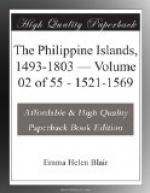must be ever kept in mind that he is “to go to
the said Filipinas Islands, and other islands contiguous
thereto, ... and to discover the return route to this
Nueva Espana with the greatest despatch possible,
bringing or sending spices and other valuable articles
of those regions.” Urdaneta must return
with the ship or ships sent back to discover the return
route, because of his experience. No person shall
be restricted from sending letters, in the return ship
or ships, to the king or the royal
Audiencia.
The commander of the return ship shall deliver all
the letters to the
Audiencia, and they, after
reading their own shall despatch the others. This
person shall be most emphatically charged to communicate
with no one until the
Audiencia has been advised
of everything that has happened since the fleet left
New Spain. Legazpi is enjoined in strong terms
to seek advice among the religious “especially
father Fray Andres de Urdaneta,” and the officers
of the fleet, on all important matters. In case
of Legazpi’s death the person succeeding to his
office is to keep these instructions faithfully.
A small box, carefully fastened, is given into Legazpi’s
keeping, containing a sealed paper in which is written
the name of the person who is to succeed to his command
in case of his death, but this person is not to be
known until such a casualty. Another similar
box, sealed and fastened as the other casket, contains
the name of the person who shall receive the command
in case Legazpi’s successor dies also. At
the end of the instructions proper is Legazpi’s
oath to observe with care the commands enjoined upon
him therein. (Tomo ii, no. xxi, pp. 145-200.)
Mejico, September 12, 1564. A letter from the
royal Audiencia to the king informs the latter
of the changes which they have made in the instructions
given to Legazpi by Luis de Velasco, who has died.
The general and other officers have left for the port
of departure, and the fleet will sail some time in
October. The first instructions, which were in
accordance with Urdaneta’s opinion, were to sail
toward New Guinea and coast along its shores in order
to discover its products and other things. “It
seemed to this royal Audiencia, discussing
and communicating in this regard with persons of experience,
who have been in those regions, that, although it be
true that the discovery of New Guinea would be important,
especially if the riches asserted should be found
there, it is not fitting that the voyage thither be
made now—both because, as it is new, it
has not hitherto been navigated; and because, doing
so now, it would be necessary to deviate widely from
the course to reach the Western Islands, and the return
voyage would be delayed; and it would be running a
great risk to navigate in an unknown course.”
The king’s letter of September 24, 1559, is
cited in support of the Audiencia’s change
in route, and they “determined to order the
general to sail straightway in search of the Filipinas
Islands, and the other islands contiguous thereto,
by the same route taken by Ruy Lopez de Villalobos.”
The Audiencia do not agree with Urdaneta (see
above, p. 81) that the Philippines are in Portugal’s
demarcation. (Tomo ii, no. xxi, pp. 200-205.)




